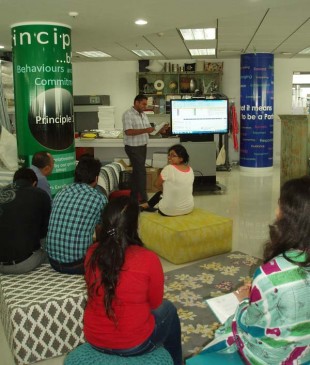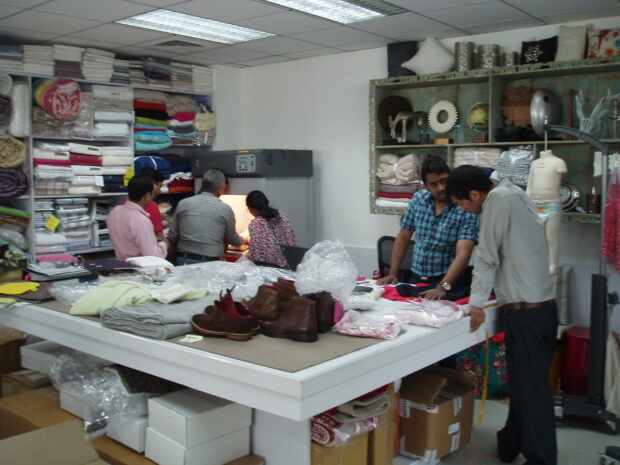I’m writing this from John Lewis’s India Sourcing Office where I'm doing a 4 week short-term placement, to learn more about the world of retail. I'll use the experience I gain to improve how I do my own job of leading DFID's thinking on responsible business, suggest new ideas to John Lewis’s HQ teams for increasing employee involvement in their suppliers' firms and influence DFID's Private Sector Department's approach to engaging with the UK retail sector.
Before I set off to John Lewis’s (JL) exciting new offices in Gurgaon, near Delhi, I had briefing meetings with about 20 HQ staff working on buying and merchandising, and all the functions which make that possible, including design and product technology, import and logistics, medium-term commercial trends, and, of course, the JL team managing my own areas of interest - sustainability and responsible sourcing.
My first reaction is that I will never see shopping in the same way again – I’d never thought about everything involved in making consuming so easy and appealing. Stating the obvious, retail is about buying and selling things. But, to a company like John Lewis, retail is fundamentally about people. And, for DFID, retail can deliver scale…..if we understand the detail. Let me explain a little more.

Retail is about things. Some parts of JL’s open plan HQ offices look very much like DFID, or the Department for Business, Innovation and Skills – lots of people diligently working at computers, in meetings, or on the phone. Unlike us, most are surrounded not by shelves of reports and paperwork, but by piles of brightly coloured towels, or glorious bedlinen, racks of women’s and children’s fashions, or displays of men’s shoes and briefcases. In the 3 weeks I’ve been visiting the HQ offices, Christmas 2014 has been signed off, and the products that will be in store for December are now appearing in samples – Christmas trees propped up in corridors, angelic decorations piled on top of filing cabinets, and bright red reindeer candlestick that I’m now also seeing in the Gurgaon office.
Retail is about people. Everyone tells you that JL’s employees own the business – they are partners, with company profits shared as a percentage of salary, amid great celebrations on the annual bonus day in early March. Partners’ happiness is a central JL constitutional tenet – the ultimate purpose of the partnership, as defined by the innovative, early twentieth century Founder, John Spedan Lewis. JL people care that their company’s commercial success is also fair to their suppliers, based on long-term business relationships, and transparent ways of doing business. But some staff debate whether collective financial reward limits individual willingness to take difficult decisions, or manage the challenges of change, in their part of the responsibilities of ownership. And others point out that, as well as financial gain, the vision gives equal weight to rewards in the form of knowledge and power, and that JL could be more innovative in delivering on both these areas, for the tens of thousands of people in the business.
Retail can deliver scale. JL has 52 buying teams, organised around product areas (with job titles featuring ‘tabletop’, ‘living and dining’, and so on). At any one time, they are dealing with about 350,000 SCUs (stock control units), not quite equivalent to products, as the same item will have a different SCU for each size and colour, for example. But you get the idea – it’s large! JL logistics specialists manage the transit of thousands of containers from dozens of ports around the world – with some products bought directly by JL, and others managed by a complex array of intermediary agents until delivery to JL’s 7 massive, automated distribution centres.
I’ve walked past JL’s Victoria Street HQ for years, with no idea that 2,500 people work there. With its 39 stores, and growing online operation, total partners are just under 30,000. The number of direct supplier firms is probably something approaching 3,000, many of which have a chain of firms supplying them. Nobody knows the exact number of people working in all JL’s supply chains, but it’s clear that a change in any part of how JL does business has the potential to touch the lives of hundreds of thousands of workers.

We need to ‘get’ the detail in retail. Each retailer has its own organisational characteristics. Some that have struck me as positive about JL may also limit the opportunities for us to work together. JL doesn’t ditch suppliers without warning if retail trends change, because buyers know that people's jobs may be at stake. JL teams seek to identify improvements and help put them in place, so suppliers are the best and trade with JL for years. Which is good – but makes it unlikely that a DFID proposition for involving new suppliers would get a toehold. JL suppliers probably provide the safe and reasonable working conditions we want to see – which makes the argument for use of public subsidy less obvious. JL buyers talk about the risk of entering new sourcing destinations like Cambodia – 1 of the countries DFID is exiting, as it moves to middle income status.
So, in my 4 weeks in India, I’m focusing on how DFID identifies the right opportunities, not just with JL, but with leading retailers more generally. Opportunities that recognise the realities of the commercial world, look for impacts at scale, are tailored, rather than generic or blueprints, and combine our strengths with theirs. And, in Gurgaon, I’m working with teams that clearly love their jobs, delight in sharing all things Indian, are extremely welcoming, and make me realise even more that short term private sector placements are a great idea!
Keep in touch. Sign up for email updates from this blog, or follow DFID's Private Sector Development updates on Twitter.

Recent Comments